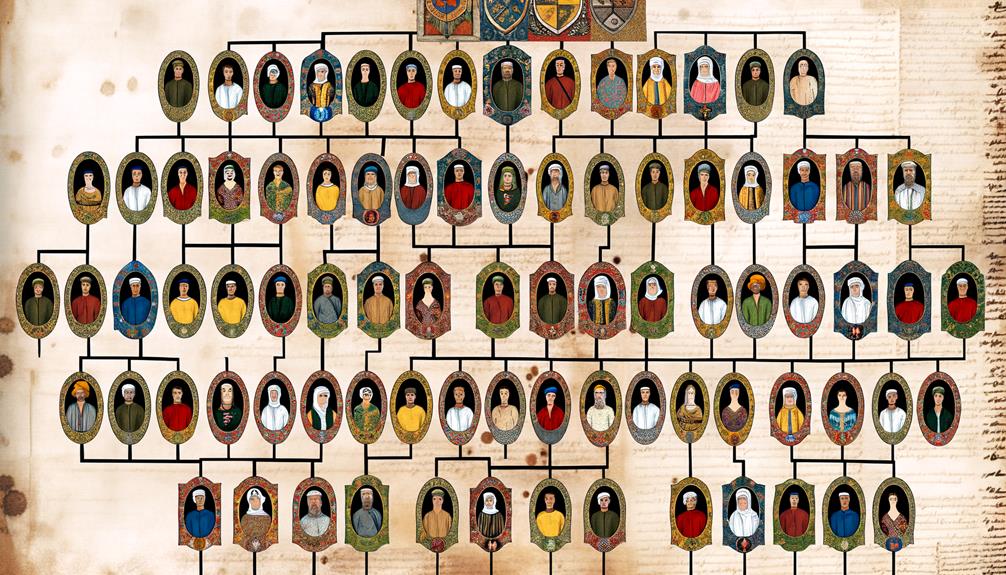Family Name Meaning in English
The meaning of family names in English is rooted in historical, occupational, geographical, descriptive, and patronymic or matronymic origins. Historically, surnames emerged to identify individuals in growing communities, often reflecting one's profession, such as 'Smith' for blacksmiths.
Geographical surnames like 'Hill' or 'Brook' denote ancestral lands or natural landmarks. Descriptive surnames provided practical identifiers, based on physical traits, like 'Brown' or 'Short'.
Additionally, patronymic names originate from the father's name, while matronymic names stem from the mother's. These conventions highlight social structures, lineage, and economic functions, offering fascinating insights into ancestral backgrounds and societal evolution.
Learn more about your surname's unique history.

Key Takeaways
- Family names often originated from professions, such as 'Smith' for blacksmiths.
- Geographical surnames like 'Hill' indicate ancestral proximity to natural landmarks.
- Descriptive surnames describe physical traits, e.g., 'Brown' or 'Short'.
- Patronymic names derive from the father's name, indicating lineage.
- Surnames reflect historical social structures and cultural practices.
Historical Background
Tracing the historical background of family names reveals their deep-rooted origins in ancient societal structures and cultural practices. Initially, family names emerged as a practical means of distinguishing individuals within growing communities.
In medieval Europe, the necessity for more precise identification arose from increasing population density and evolving administrative systems. Surnames often reflected geographical locations, such as 'Hill' or 'Brook,' indicating a family's place of origin or residence.
Cultural practices, including inheritance and lineage, further solidified the use of family names. As societies became more complex, these names facilitated legal and economic transactions, ensuring continuity and recognition across generations.
Therefore, family names evolved from simple identifiers to significant socio-cultural markers, playing an important role in the fabric of historical human interaction.
Occupational Names
Occupational surnames, derived from the professions and trades of their bearers, provide a fascinating window into the economic history and labor dynamics of past societies. Names like 'Smith' reflect the essential role of blacksmiths in medieval economies, while 'Baker' indicates the crucial nature of bread-making.
Such surnames often became hereditary, passing from one generation to the next, thereby preserving the historical significance of various trades. These names were not just identifiers but also indicators of social status and economic function.
For instance, 'Cooper' refers to barrel makers, a key trade in times when storage solutions were paramount. The prevalence and distribution of occupational surnames reveal much about the labor structure, specialization, and technological advancement of bygone eras.
Geographical Origins
While occupational surnames offer insights into historical livelihoods, geographical origins of family names provide a rich tapestry of migration patterns, cultural influences, and settlement histories. These surnames often denote the ancestral homeland, a specific landmark, or a geographical feature. For example, 'Hill' might indicate an ancestor who lived near a hill, while 'Brook' would point to proximity to a stream.
| Surname | Origin Indicator | Example |
|---|---|---|
| Hill | Landscape Feature | Residence near a hill |
| Brook | Water Body | Proximity to a stream |
| London | City Name | Origin from London |
| Wood | Forest Area | Lived near woods |
Understanding these origins not only elucidates where families might have resided but also reflects historical settlement patterns and cultural exchanges.
Descriptive Surnames
Descriptive surnames historically emerged as a means of distinguishing individuals based on specific characteristics or roles within their communities. Occupational-based surnames, such as Smith or Baker, directly reference the trades and professions of the name bearers, reflecting the societal structure of the time.
Similarly, surnames originating from physical traits, like Brown or Short, provided a straightforward descriptor of an individual's appearance, underscoring the practical nature of early surname development.
Occupational-Based Surnames
Many surnames historically stem from the occupations of our ancestors, offering a fascinating glimpse into the professions that were once commonplace.
This category, known as occupational-based surnames, includes names like Smith, derived from blacksmiths who forged metal tools and weapons, and Miller, originating from those who operated mills.
Such surnames served not only as identifiers but also as markers of social status and economic roles within medieval communities.
Names like Baker, Carpenter, and Weaver further exemplify this trend, each reflecting a specific trade skill that was essential to the community's livelihood.
Understanding these surnames provides valuable insights into the economic structures and daily lives of our forebears, revealing the integral roles these professions played in historical societies.
Physical Traits Origins
The origins of descriptive surnames often lie in the physical characteristics of individuals, providing a historical snapshot of how society perceived and categorized people based on their appearance. Names such as 'Short,' 'Brown,' or 'Armstrong' exemplify this practice, reflecting traits like height, hair color, or physical strength.
These surnames were not just identifiers but also conveyed social insights, as physical attributes were often linked to societal roles or statuses. For instance, 'Fair' might denote someone with a fair complexion, possibly indicating nobility or a higher social class.
Analyzing these descriptive surnames reveals the importance of appearance in historical social structures and how such traits were immortalized in the lineage and identity of families.
Patronymic and Matronymic Names
Tracing the origins of patronymic and matronymic names reveals a rich tapestry of historical and cultural practices in naming conventions across various societies.
Patronymic names, derived from the father's name, were prevalent in ancient Greek, Norse, and Slavic traditions, often signifying lineage and paternal heritage. For instance, the Greek 'Papas' becomes 'Papadopoulos,' meaning 'son of Papas.'
Conversely, matronymic names, derived from the mother's name, were less common but notable in certain cultures, including early Celtic societies.
These naming conventions served not only as identifiers but also as markers of familial connection and social status.
Understanding these practices offers insight into how different cultures valued lineage and kinship, reflecting deeper societal values and structures.
Evolution Over Time
As societies evolved, naming conventions transformed to reflect changes in social structures, migration patterns, and cultural exchanges.
In medieval Europe, surnames began solidifying as populations grew and the need to distinguish between individuals with similar given names increased. The Norman Conquest of England in 1066, for instance, introduced new naming traditions, blending Norman, Anglo-Saxon, and Viking influences. Names derived from professions (e.g., Smith), locations (e.g., Hill), and descriptive traits (e.g., Brown) became prevalent.
The Renaissance period further diversified surnames through increased scholarly and artistic exchanges across Europe. Colonial expansion in the 16th and 17th centuries introduced European surnames to the Americas and other regions, where they adapted to new linguistic and cultural contexts, creating a rich tapestry of family names globally.
Researching Your Surname
Understanding the historical evolution of surnames provides a foundational context for effectively researching your own family name. Begin by examining historical records such as census data, birth and death certificates, and immigration documents. These sources often reveal the geographic origins and initial variations of your surname.
Additionally, consider consulting heraldic records if your surname has aristocratic ties. Linguistic studies can also be invaluable, as surnames often derive from occupations, locations, or personal characteristics in older languages.
Online databases and genealogy websites offer access to extensive archives, enabling you to trace your surname through various lineages and regions. Collaborating with genealogists or joining surname-specific forums can further enrich your understanding, ensuring a thorough exploration of your family name's history.
Conclusion
The intricate tapestry of English family names weaves together historical, occupational, geographical, descriptive, and patronymic or matronymic threads.
This rich nomenclature, evolving over centuries, offers a window into ancestral lives and societal shifts.
Delving into one's surname reveals a heritage that speaks to the labor, locales, and legacies of forebears, quietly urging a deeper connection to the past.
Unraveling these names is akin to starting on a poignant journey through time, honoring the quiet echoes of history.






